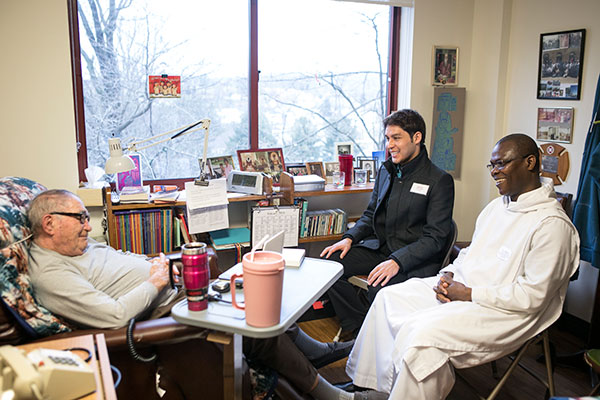Deliberate Care
Fr. Adrian Burke, OSB
Thursday, April 16, 2020

Now the ladder erected is our life on earth … we may call our body and soul the sides of this ladder.”
Rule of Saint Benedict 7.8-9
In his chapter on humility (RB 7), St. Benedict acknowledges that as persons we are both physical and spiritual. We have bodies (made of the same stuff as everything else), and we have an interior, psychic landscape of thoughts, emotions, affections, memories and knowledge, understanding and wisdom, all of which make us more than merely material beings, they make us personal beings. St. Paul also mentions the deeper, “inmost” dimension of our being – the mysterious, spiritual ground of our personality wherein God dwells.
Benedict presents the image of a ladder by which we ascend to the perfection of charity by means of “rungs” made of external actions – embodied, outward behaviors by which we strive to express charity – and interior attitudes, or dispositions of the soul, that are reinforced when we behave in virtuous ways, which we can cultivate through the disciplines of prayer and care (service) which dispose us to grace, God’s gifts of growth and healing.
This thought comes to mind in the midst of “social distancing” and unrest about the future because in order for us to truly be who God calls us to be, which is the basis of authentic humility, we must care for others. It may seem counterintuitive, but to do that we must learn to take proper care of ourselves as well.
St. Benedict writes that the monk must be obedient not only to superiors but to one another – our fellow community members – because by subjecting ourselves to one another we reverence Christ (Eph. 5:21), and “it is by this way of obedience that we go to God” (RB 71.2). To be mindful of putting the safety of the more vulnerable in our communities ahead my own concern for self, I need to be sure that I am minding my own emotional, physical and spiritual well-being.
In this time when churches are closed, this may require being more deliberate about prayer and meditation while “hunkering down” at home. More deliberate too about our need to relieve stress and anxiety by getting some fresh air and exercise. We may also need to be more deliberate about caring for others, perhaps calling the next door neighbor who lives alone, or that elderly couple who lives down the street, or in the next farmhouse over, to check in on them, to let them know they aren’t alone and asking if they need anything. This is a way to exercise who we are meant by God to be.
Thomas Merton taught that “spiritual life just is life, period” – and human life involves the physical, psychological (mental/emotional) and spiritual dimensions of being. So we mustn’t forget to take care of our whole self – body, mind and spirit. In this time of social distancing, and for some in our communities that can feel more like social isolation, we have to make sure we are eating healthy and getting some fresh air and exercise, praying and meditating, and doing what we can, as we can, to tend to the needs of others, responsibly.
Perhaps one of the “silver linings” of this pandemic is that we learn better how to love our neighbor as “another self”, to love ourselves as God loves us, and to do whatever is necessary to care for the vulnerable and at risk among us. After all, God first loved us as God’s self, as those made in God’s own image, and now as “other Christs” made new by baptism – so let’s do as God does. Be well, stay safe, and pray often!